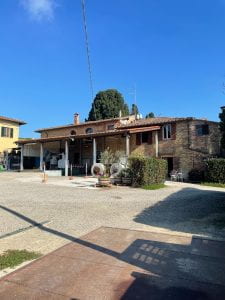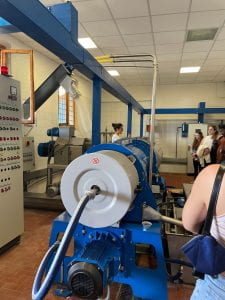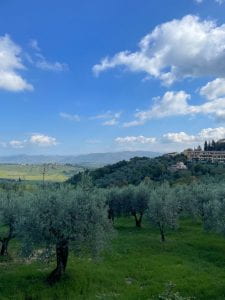O live oil is a well-known product in Italy. Tuscany especially has many grooves of olive trees surrounding its countryside. In the late 14th century, the region of Tuscany couldn’t partake in increasing world trade due to war and thieves, therefore they invested in themselves by planting olive trees and grapes. One of the school trips is called, gives you a brief idea of what olive farming looks like. They took us to a small town right outside Florence called Impruneta. In the city, the school bought the group coffee and took us to a historic church that had been rebuilt after being bombed during WWI. The countryside is beyond beautiful, and the visit ends with a guided tour of Antico Frantoio Doglia which is an olive oil production farm run by two young sisters. They explain the deep rich history of their land which goes back to the Roman Empire and the planting of olive trees dating back to the Renaissance. The tour also included seeing the
live oil is a well-known product in Italy. Tuscany especially has many grooves of olive trees surrounding its countryside. In the late 14th century, the region of Tuscany couldn’t partake in increasing world trade due to war and thieves, therefore they invested in themselves by planting olive trees and grapes. One of the school trips is called, gives you a brief idea of what olive farming looks like. They took us to a small town right outside Florence called Impruneta. In the city, the school bought the group coffee and took us to a historic church that had been rebuilt after being bombed during WWI. The countryside is beyond beautiful, and the visit ends with a guided tour of Antico Frantoio Doglia which is an olive oil production farm run by two young sisters. They explain the deep rich history of their land which goes back to the Roman Empire and the planting of olive trees dating back to the Renaissance. The tour also included seeing the modern technology and the green methods of recycling waste they use during each stage. Whether that be creating mulch or sending leftover pulp to a factory that will use the gas from the breakdown of the olives to produce green energy, nothing is wasted. After the tour was complete there was an olive oil tasting. The olive oil tasting would be my only critique of the trip because we each only got two golf ball-sized pieces of bread with oil, cheese, and tomato. Everything was terrific but I wouldn’t consider it an olive oil tasting. More of an oil sample, because we only tried one of their products and very little of it. Once all is said and done, it was a great trip!
modern technology and the green methods of recycling waste they use during each stage. Whether that be creating mulch or sending leftover pulp to a factory that will use the gas from the breakdown of the olives to produce green energy, nothing is wasted. After the tour was complete there was an olive oil tasting. The olive oil tasting would be my only critique of the trip because we each only got two golf ball-sized pieces of bread with oil, cheese, and tomato. Everything was terrific but I wouldn’t consider it an olive oil tasting. More of an oil sample, because we only tried one of their products and very little of it. Once all is said and done, it was a great trip!

To switch topics, time is flying by so fast that it feels surreal to have been here for almost two months. Although that doesn’t mean I haven’t met my fair share of mental challenges. Weirdly enough I haven’t had any homesickness yet, but I know I’m not out of the clear. Before beginning to speak on my what has caused these mental challenges, I want to remind people this is based on my personal experience and what I’ve heard from friends. I also have friends in homestays that haven’t experienced these issues because every homestay is totally different. For me living in a homestay has caused a few cultural shocks/ challenges. Italy is known for its sense of family and food. So, if you have a complicated relationship with food, I’d beware that some host moms do push eating lots of food on you. Though I always try my best to remember it is a way they show love and not a control aspect. My host calls my roommate and I “her little chickens” because she claims we never eat food after eating 2 or 3 servings for dinner. Also, because most of my friends here are in homestays it seems very common that you’ll have a better relationship with your host family if you keep them informed about when you’re going places/ when you’ll be back. In addition, I know that cleanliness is another issue that has come up with my friends and my roommate. The “normal” level of cleanliness of a college dorm room will most likely not pass here. A bunch of the families hire people to clean. If your room isn’t picked up it can cause tension with your family. In the end, I still would choose a homestay over any other living situation option. Hotel/dorms are a 25-min walk from campus and only one kitchen works in the entire building. The other option is an apartment, but that seems to work best if you’re going with a group you already know. Being a singular Whittie who didn’t know anyone before coming, the homestay was definitely the best option!
Ciao,
Rebecca


